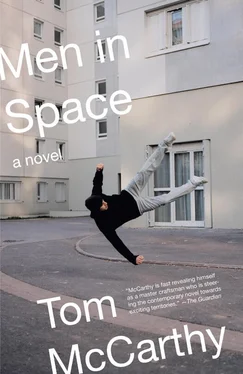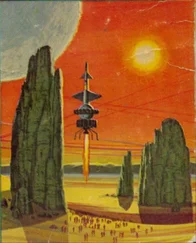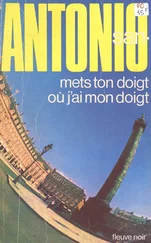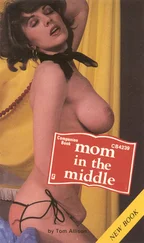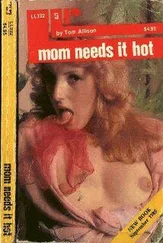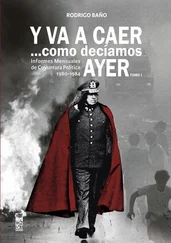The oil has stopped crackling. She can pick out currents circulating round the chip pan, silky threaded cumuli billowing within the outwardly still mass. She turns the gas down, wipes her hand on a dish towel and leaves the kitchen. In the main room, on the round table, piles of paper are arranged around her typewriter in a large circle, like clock-patience cards. Anton’s taken the table’s chair away but left the papers untouched. He’s pulled the chair up to face him where he’s sitting on the sofa and covered its surface with today’s Lidové noviny , onto which he’s letting drop the skin of the potatoes he’s peeling.
“I haven’t read it yet!”
He looks up:
“It’s just the sports pages. You don’t read those.”
“The water will have seeped through to the others.”
“No it won’t. Look.”
He scrumples the top double-page up into a peel-filled ball. The double-page below is wet. He takes this out as well and scrumples it into a smaller ball. The rest is dry. He looks at her and smiles:
“I have a question. If this,” he says, holding the larger ball, the one with the peelings inside, up in his left hand, “is the earth, and say the lamp here is the sun, so, hang on, it’s tilted this way right now because it’s winter, the equator’s here, and here’s us, Praha , right where this guy in the photograph is standing. And this,” he continues, picking up the smaller ball, “is the moon, and it’s going around us once every twenty-four hours and, hang on, we’re spinning too, like this, you follow …”
“Do you remember what my first degree’s in?” She smiles faintly. Behind Anton all the filing cabinet’s doors are open. She should try not to look at it, try to give him all of her attention. She forces a stronger smile out, but it seems fake so she quickly lets the muscles round her mouth relax again.
“No,” Anton says, laughing. If he noticed the twitch he’s overlooking it like the good referee he is, allowing minor infringements go unchecked so as to let the game flow smoothly. “I mean do you follow my demonstration?”
“Yes, I follow …” Now her nose is twitching, but her hands are still covered in gunk. It always twitches when your hands are out of action, carrying something or dirty …
“So. My question is: can you only see the moon during the daytime when it’s winter?”
“During the daytime? Of course not. You see it at night mostly.”
“No, I mean when the moon’s up but it’s still light. Does this phenomenon occur exclusively in wintertime?”
“Oh, right … No.” She rubs her forearm against her nose, a little too hard; it sends a stabbing sensation up into her eyes. They must be tired. She was reading the carbon copies of her letters from the moment she came back from work at three-thirty to when Anton came in half an hour ago. That’s more than three hours. “The moon vacillates round the horizon line a lot. This is what Eudoxus of Cyzicus grappled with. He had to add a third concentric sphere to his geometrical model to explain variations in its altitude — and a fourth one for retrograde motions.”
“Are those epicycles?”
“No, that’s Apollonius. Or Ptolemy. Epicycles, deferents, I forget them all … But basically, you can see the moon in daytime whenever the sun shines from low on the horizon and hits it. So, yes, it will happen a lot in winter. But on summer mornings too. And evenings. So, no: not just in winter.”
“And can it happen in both hemispheres?”
“Why not?”
“OK … Oh, one other thing. If this,” he continues, grabbing a peeled potato from the bowl of water, “is the morning star, Mars … Is Mars the morning star?”
“No. Venus is the morning star …”
The Sophia Planetarium: is he thinking about this too? It was the first time they’d gone anywhere alone together — not that it seemed like a date. It hadn’t occurred to her that this boy in Toitov’s class, the short boy with the clownish face, might be attractive. And she was married at the time — unhappily. Maybe that’s what swung it: the contrast between Dimitar’s sharp but humourless good looks, his glazed, opportunistic eyes, and Anton’s strangely luminous brown eyes, the fat lips beneath them that seemed to be perpetually smiling. Toitov had been lecturing excitedly about the discovery by sponge divers off Antikythera, among amphorae and statues of nude women, of thirty small, corroded bronze plates and gear wheels, dating back to 77 BC, with the symbols and notches of an astronomical calendar inscribed on them — effectively a shoebox-sized planetarium. Anton had jokingly complimented her on her national achievements as they left and wandered up Boulevard Tsar Osvoboditel towards the Largo — she thinking that she’d catch the trolley bus on Narodno Sabranie, and then, when they’d wandered past there, that she’d walk on to Knyaginya Maria-Luiza and catch one there — until they found themselves, coincidentally, in front of the domed building on Positano. Or had he slyly led them there? She never asked. He said Have you ever been in here before? and she said No ; he said Me neither , so in they went. There was no contact to speak of: maybe he took her coat for her, brushed against her as they moved into the main hall — nothing more than that. No: it was when the planets, then the stars and then whole galaxies started sliding around them that she got the frisson, felt him tense up with awe beside her, both of them exhilarated by this immersion in pure movement. A mechanical illusion, doubly misleading: what her ancestors had never realized (an error tacitly repeated in the gears and plates of the projector) is that stars don’t move, and here in the planetarium, despite semblances, neither did she and Anton — but when they emerged back into the daylight an itinerant complicity had already taken hold of them. That they should end up fleeing Bulgaria to marry seemed right; and it seemed right that they should leave Europe entirely, emigrate to America, where Anton had an uncle. They’re hosting the World Cup in ninety-four , he’d say excitedly. They’ll need good referees. All the kids play football there: our children will play it as well. Kristof and Larissa too …
Kristof and Larissa were their one point of susceptibility. Dimitar knew it, and knew, with his political connections, what to do about it. So now they’re halted, slowed down by this weight she drags behind her like the moon drags all the oceans. She worries that that’s how Anton sees it, anyway. He’s said he doesn’t mind: he’ll wait until they can all go to America together, there’s no immediate hurry, he can probably get an extension on the visa … Which is all true; she can rationalize it all. But it’s the betrayal she feels bad about. Their whole liaison, since that first afternoon, has been predicated on free, unencumbered transit, movement massing to escape velocity, to warp speed. What she’s done is to go and get herself encumbered.
“But does the evening star show …”
“It’ll have to wait, Anton. The oil’s ready. Give me the potatoes.”
In the kitchen she slices them and slides the slices from the board into the pan. The oil jumps and hisses. Helena dips her fingers in the flour again, then scoops handfuls of mixture from the bowl and pats these into balls, which she arranges in a Teflon-coated frying pan. Earth, Sun, Moon, Venus, Mars, plus one more to make three each: Mercury. Or maybe America. She goes over to the window and opens it slightly. The windows of the other buildings backing onto their courtyard are flickering different colours. It’s the television sets. She can’t see the sets themselves but she can tell who’s watching which channel because the lights in whole clusters and rows of windows change from one colour to another at the same time. It seems that everyone is watching one of two channels: a quickly alternating blue-green-red one and a constant purple one. Anton’s making a phone call in the next room, speaking in English. She can’t quite hear what he’s saying; he’s put on his Santana record. She goes over to the cooker, flips the meatballs, fishes a loose pine nut out onto the counter, picks it up and throws it into her mouth before it burns her fingers. She hears Anton put the phone down. A few seconds later he comes into the kitchen.
Читать дальше
